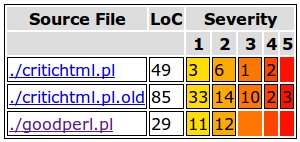Perl::Critic is great. If you haven’t tried it, you should. It can help you improve the quality of your code no end.
I wrote this script to make it easier to view the feedback in the context of the code itself. When run in a directory containing Perl code it’ll create a critic_html directory containing index.html summarizing the results:

Clicking through to any of the files will give you all the violations found by Perl::Critic, inline with the code:

In addition to Perl::Critic, the script uses Template::Toolkit to format the output. The code below and templates can be found in the attached critic_html.zip
#!/usr/bin/perl
use strict;
use warnings;
use Perl::Critic;
use Perl::Critic::Utils;
use Template;
use Cwd qw(abs_path);
use File::Basename;
use English qw(-no_match_vars);
use constant SEVERITY => 1; # Include all violations.
use constant SKIP_GOOD => 0; # Skip files with no violations?
mkdir 'critic_html';
mkdir 'critic_html/src';
use autodie;
# Analyse all perl files below the current directory.
my @files = Perl::Critic::Utils::all_perl_files(q{.});
my @summary = (); # Store statistics on each file processed.
foreach my $file (@files) {
# Create a new Critic for per file statistics.
my $critic = Perl::Critic->new( '-severity' => SEVERITY );
my $file_safe = $file;
$file_safe =~ s/[W]/_/g;
my @violations = $critic->critique($file);
next if (!@violations && SKIP_GOOD);
push @summary, { 'filename' => $file,
'link' => "src/$file_safe.html",
'stats' => $critic->statistics() };
open my $FH, '<', $file;
my @lines = <$FH>;
close $FH;
# Attach all violations to the line they were found on.
my @violations_by_line = ();
my $line_number = 1;
foreach my $line (@lines) {
# Get all the violations for the current line.
my @line_violations = grep { $_->line_number() == $line_number} @violations;
push @violations_by_line, { 'number' => $line_number,
'content' => $line,
'violations' => @line_violations };
$line_number++;
}
write_html("critic_html/src/$file_safe.html", 'codefile', { 'title' => "Critic Analysis of $file",
'lines' => @violations_by_line } );
}
write_html('critic_html/index.html', 'index', { 'title' => 'Perl::Critic::HTML Summary',
'files' => @summary });
sub write_html {
my ($filename, $template, $data) = @_;
# Include templates from the install directory.
my $tt = Template->new({ 'INCLUDE_PATH' => dirname(abs_path($PROGRAM_NAME)).'/templates' } );
print "Writing $filenamen";
open my $FILE, '>', $filename;
$tt->process($template, $data, $FILE);
close $FILE;
return;
}



